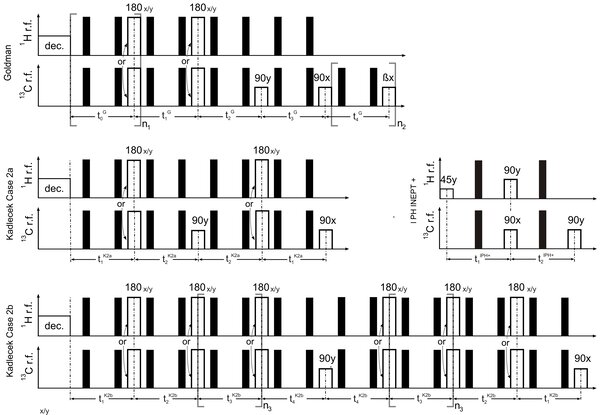Spin Order Transfer
The hyperpolarization of nuclear spins promises to overcome the single greatest impediment of magnetic resonance: its inherent insensitivity, and holds great potential for e.g. biomedical research. Strong signal enhancements have been demonstrated e.g. by transforming the spin order of parahydrogen (pH2) to net polarization of a third nucleus (e.g. 13C). This is achieved by means of a spin-order-transfer (SOT) sequence. The polarization achieved is vitally dependent on the sequence parameters, which are a function of the J-coupling constants of the molecule to be polarized. How to derive the SOT sequence parameters, the actual values for common molecules as well as the (theoretical) polarization yield and robustness, however, is not fully described for all sequences.
In this project, <bf>(a) we provided simple methods to obtain the sequence parameters for a given set of J-coupling constants (i.e. of a new hyperpolarization agent), <bf>(b) we exemplify the methods by providing optimal SOT sequence parameters and the resulting polarization yield for molecules previously used for hyperpolarization, and <bf>(c) assess the robustness of the sequences against imperfections of the pertinent experimental parameters.

Figure 1: Schematic representation of the SOT sequences suggested by Goldman, Kadlecek and Haake (PHINEPT+). Enhanced heteronuclear polarization is available after the last r.f. pulse in each sequence. Refocusing pulses during the free evolution intervals are marked in black, while functional SOT inversion pulses are hollow. Haake’s sequence was modified to obtain longitudinal spin order (l-PHINEPT+). We found that the choice of channel (1H or X, here: 13C) and phase (x,y) of functional SOT 180 pulses do not change the polarization yield under ideal conditions, but may reduce the effect of B1- or J-coupling errors
The results of this project were published in:
Bär S, Lange T, Leibfritz D, Hennig J, v. Elverfeldt D, Hövener J-B: “on the spin order transfer from parahydrogen to another nucelus”, J Magnetic Resonance, 2012, in press, DOI 10.1016/j.jmr.2012.08.016
Dr. Andreas B. Schmidt
Head of Hyperpolarization
Tel.: +49 761 270-93880
E-Mail: andreas.schmidt@uniklinik-freiburg.de
University Medical Center Freiburg
Dept. of Radiology · Medical Physics
Killianstr. 5a
79106 Freiburg

